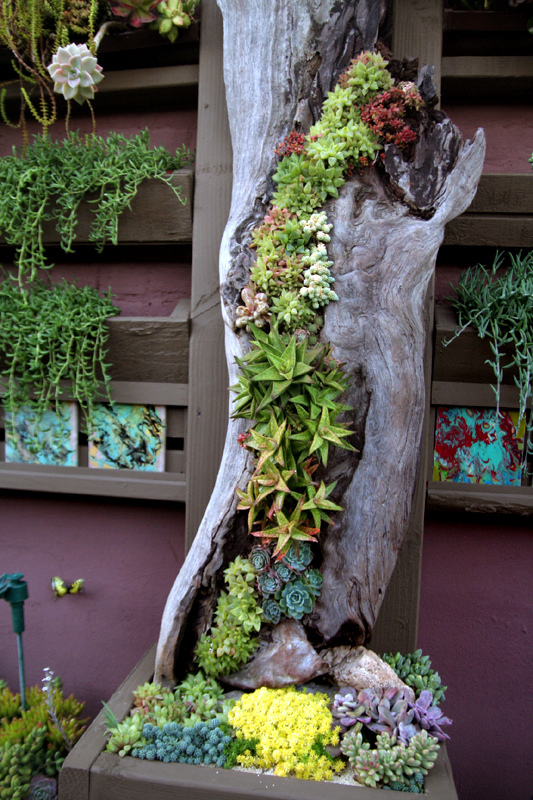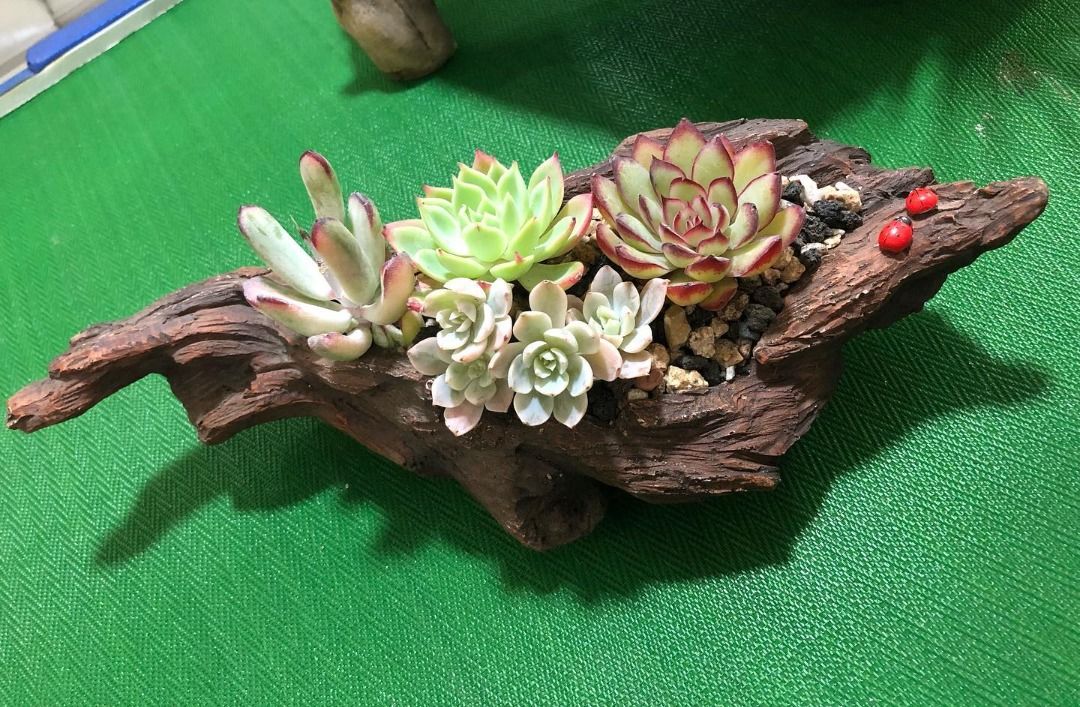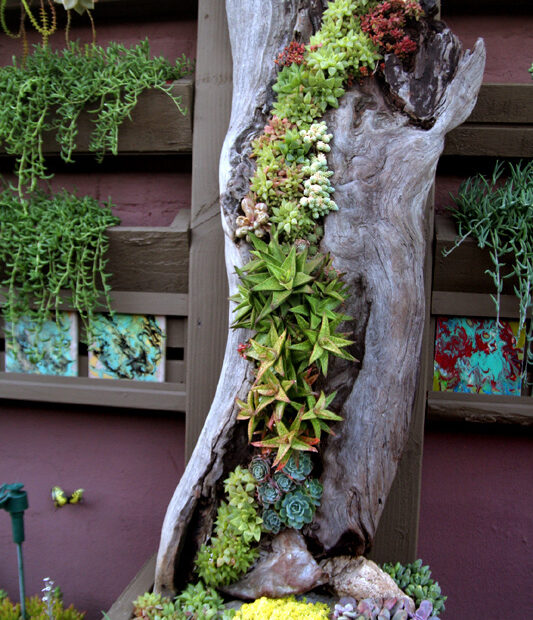Succulents are a hardy breed of plants known for their ability to thrive in extreme conditions, including intense heat, drought, and minimal sunlight. Their unique shapes, textures, and colors have made them a popular choice for home decor and landscaping. Pairing these plants with wooden logs brings a natural element to your indoor or outdoor space and creates a perfect balance between modern and rustic.
While many different types of succulents can be used for this project, it’s important to choose the right log for your display. A wooden log with a hollow or crevice makes the perfect planting spot for succulents as it can hold soil and retain moisture, creating an ideal environment for plant growth.
Overall, succulents in wooden logs are an excellent way to add character to your living spaces while showcasing the beauty of nature. With a little bit of creativity and the right combination of plants and logs, you can create a unique and stunning display that will be sure to catch the eye of anyone who sees it.
Found 26 images related to succulents in wooden log theme

/succulent-picture-painted-frame-116e6577-b3b73532005240d3aa3299efd16c1949.jpg)





:strip_icc()/double-dish-succulent-garden-b3188f14-08c6cfd53ecf4f809ae6ba9508781cab.jpg)



succulents in wooden log
Benefits of Growing Succulents in Wooden Logs
1. Better Drainage and Aeration in Wooden Logs for Succulents
The natural properties of wooden logs make them ideal for planting succulent plants. When you drill or hollow out a wooden log, the natural porousness of the wood allows for better drainage and aeration of the soil. This is especially important for succulent plants, as they require well-draining soil to prevent root rot and other diseases. The wooden log also absorbs excess water, which helps to prevent moisture build-up and fungal growth.
2. Natural and Aesthetically Pleasing DIY Containers for Succulents
Wooden logs offer a unique and natural way to display succulent plants, while also adding a rustic and aesthetically pleasing element to your garden or home décor. Wooden log planters can be purchased or made into DIY planters using simple tools such as a saw, drill, and sandpaper. The natural color and texture of the wood, combined with the striking colors and shapes of succulent plants, make for a beautiful and eye-catching display.
3. Serves as a Natural Fertilizer for Succulent Plants
Wooden logs are also a great natural fertilizer for succulent plants. As the wood decomposes over time, it releases essential nutrients into the soil, which helps to promote healthy growth and development. This is especially beneficial for outdoor wooden log planters, as they are exposed to the natural elements and organisms that break down the wood.
4. Low Maintenance and Long-lasting Wooden Log Planters for Succulents
Another benefit of wooden log planters is their durability and low maintenance requirements. Wooden logs are resistant to pests and weathering, making them a long-lasting option for planting succulent plants. They also require little to no maintenance, aside from occasional watering and pruning. This makes them a convenient option for people who want to add some greenery to their home or garden without spending a lot of time or effort on upkeep.
5. Indigenous Forest Products to Promote Sustainable Gardening Practices
Using wooden logs as planters is a sustainable gardening practice, as it promotes the use of indigenous forest products. Rather than purchasing plastic or non-biodegradable planters, using wooden logs is a way to make use of natural materials that would otherwise go to waste. This also reduces the carbon footprint associated with manufacturing and transportation of plastic planters.
Tips on How to Create Wooden Log Succulent Planters
1. Choosing the Right Type of Wood for Your Wooden Log Planter
When choosing the right type of wood for your wooden log planter, it is important to consider the characteristics of the wood. Cedar, redwood, and cypress are all good options, as they are naturally resistant to decay and pests. Avoid using treated lumber or any type of wood that has been painted or stained, as these can contain harmful chemicals that may be toxic to your succulent plants.
2. Preparing and Treating Wooden Logs for Planting Succulents
Before planting succulent plants in your wooden log planter, it is important to prepare and treat the wood. This includes drilling or hollowing out the log to create space for soil and plants. You may also need to sand down rough edges or surfaces to prevent injury or damage to your plants. Additionally, it is recommended to apply a wood preservative or sealer to the log, as this will help to preserve its natural color and texture, while also protecting it from decay and pests.
3. Choosing the Right Size and Shape of Wooden Log for your Succulent Plants
When choosing the right size and shape of wooden log for your succulent plants, consider the size and shape of the plants themselves. Succulents come in a variety of sizes and shapes, so it is important to choose a log that can accommodate their growth and visual appeal. Additionally, consider the location and space where you will be placing your wooden log planter. Make sure it fits in the space and complements the surrounding décor.
4. Deciding on the Best Type of Succulent Plants for your Wooden Log Planter
Choosing the best type of succulent plants for your wooden log planter depends on a variety of factors. Consider the amount of sunlight and shade that your planter will receive, as well as the size and shape of the plants. Some succulent varieties that thrive in wooden logs include Echeveria species, Haworthiopsis attenuata, Graptosedum ‘Alpenglow’, Sedum morganianum, and Crassula ovata.
5. Proper Care and Maintenance for Your Succulent Wooden Log Planter
Proper care and maintenance for your succulent wooden log planter includes regular watering, pruning, and soil maintenance. Water your succulent plants infrequently, and make sure the soil is well-draining and free of excess moisture. Prune any dead or damaged leaves, and fertilize occasionally with a natural fertilizer such as compost or worm castings.
Succulent Varieties that Thrive in Wooden Logs
1. Echeveria species: Ideal for Wooden Log Succulent Planters
Echeveria is a popular succulent plant that is ideal for wooden log planters. These plants have a rosette shape and come in a variety of colors and textures. They require infrequent watering and moderate sunlight, making them a low-maintenance option for wooden log planters.
2. Haworthiopsis attenuata: Suitable for Wooden Log Planters with Low Light
Haworthiopsis attenuata, also known as the zebra plant, is a succulent that thrives in low-light conditions, making it a suitable choice for wooden log planters that are placed indoors or in shady areas. They have a compact and symmetrical shape, and do not require frequent watering.
3. Graptosedum ‘Alpenglow’: Popular Succulent for Wooden Log Planters
Graptosedum ‘Alpenglow’ is a hardy succulent with beautiful rosettes that come in shades of pink, purple, and green. They require infrequent watering and moderate sunlight, making them a popular choice for wooden log planters.
4. Sedum morganianum: Perfect for Hanging Wooden Log Succulent Planters
Sedum morganianum, also known as the burro’s tail, is a succulent that is perfect for hanging wooden log planters. Their slender stems grow up to 3 feet long and are covered in light green leaves. They require infrequent watering and bright light, making them ideal for spaces with ample sunlight.
5. Crassula ovata: Adaptable Succulents that Thrive in Wooden Logs
Crassula ovata, also known as the jade plant, is a hardy succulent that is adaptable to a variety of growing conditions, making it a good choice for wooden log planters. They have a tree-like appearance and come in a variety of colors and textures. They require infrequent watering and bright light.
DIY Wooden Log Succulent Planter Ideas
1. Simple Wooden Log Succulent Planter for Indoors and Outdoors
A simple wooden log succulent planter involves drilling a hole in the center of a wooden log and filling it with soil and succulent plants. This planter can be used indoors or outdoors, and can be customized with different types of plants and decorations.
2. Wooden Log Succulent Planter with Drainage Holes and Chalkboard Labels
This wooden log succulent planter involves drilling drainage holes in the bottom of the log and attaching chalkboard labels to the front of the log. This allows for easy labeling and organization of your succulent plants.
3. Wooden Log Pyramid Planter for Succulents in a Tiered Display
A wooden log pyramid planter involves stacking multiple wooden logs in a pyramid shape and filling each one with soil and succulent plants. This creates a tiered display of succulent plants that adds visual interest and dimension to your garden or home décor.
4. Rustic Wooden Log Succulent Planter with Faux Moss Accents
This rustic wooden log succulent planter involves adding faux moss accents to the exterior of the log, giving it a natural and whimsical appearance. This can be achieved using green-colored yarn or moss-like fabric.
5. Wooden Log Succulent Terrarium with Glass Top and Bottom Sections
This wooden log succulent terrarium involves hollowing out the center of a wooden log and adding glass top and bottom sections. This creates a closed terrarium that allows for controlled humidity and moisture levels, making it an ideal environment for succulent plants.
Precautions and Safety Tips When Working with Wooden Logs and Succulent Plants
1. Choosing Safe and Non-Toxic Wood for Your Wooden Log Succulent Planter
When choosing the right type of wood for your wooden log succulent planter, make sure it is safe and non-toxic. Avoid using treated lumber or any type of wood that has been painted or stained, as these can contain harmful chemicals that may be toxic to your succulent plants.
2. Preparing and Cleaning Wooden Logs and Tools for Your DIY Project
Before starting your DIY project, make sure to prepare and clean your wooden logs and tools. This includes sanding down rough edges or surfaces, cleaning your tools, and storing your logs in a dry and cool place.
3. Wearing Protective Gear such as Gloves and Safety Glasses
When working with wooden logs and tools, it is important to wear protective gear such as gloves and safety glasses. This will prevent injury and protect your hands and eyes from sawdust and debris.
4. Handling Succulent Plants with Care and Proper Watering Techniques
When handling succulent plants, it is important to do so with care and proper watering techniques. Avoid over-watering or under-watering your plants, as this can lead to root rot or dehydration.
5. Storing and Disposing Wooden Logs and Succulent Plants Safely
When storing or disposing of wooden logs and succulent plants, make sure to do so safely and responsibly. Avoid burning wooden logs or disposing of them in wooded areas, as they can be a fire hazard. Additionally, avoid disposing of succulent plants in natural habitats such as deserts or forests, as they can become invasive species and harm the natural ecosystem.
Keywords searched by users: succulents in wooden log wood log planter, log planter ideas, hollow log planters for sale, log planter diy, log planter box, natural wood log planters, outdoor log planter, wooden succulent planter
Tag: Update 88 – succulents in wooden log
Succulent Arrangement In A Wooden Log | Succulent Garden DIY – Succulent Garden Ideas #succulents
See more here: khoaluantotnghiep.net
Article link: succulents in wooden log.
Learn more about the topic succulents in wooden log.
- How To Make An Awesome Log Planter For Succulents and …
- Transform wooden salad bowl into succulent planter
- 3 Ways To Attach Succulents To Driftwood, So They Can Grow / Joy …
- Fun and clever succulent projects
- How to Make a Wood Log Planter for Succulents
- Succulent Log – Etsy
- How To Make An Awesome Log Planter For Succulents …
- DIY: Create Your Own Wooden Log Succulent Planter
- How to make a wood log planter with succulents
Categories: khoaluantotnghiep.net/wikiimg
